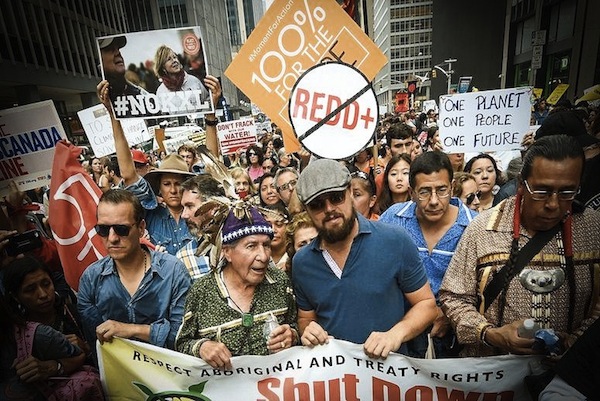A new report finds that over the past year, the amount of money committed to be pulled from companies that produce coal, oil, and natural gas has grown fifty-fold.
Over the past year, investors holding $2.6 trillion in assets have pledged to divest from companies that produce coal, oil, and natural gas, according to a report issued Tuesday.
The study was issued by the group Divest-Invest, which calls on institutional and private investors to hold themselves accountable for the environmental impacts of their investments.
“One year ago today, exactly, we announced that the total [divestment] at that point was $52 billion, and committed to tripling that amount before the U.N. Climate Conference in Paris in December of this year,” said Ellen Dorsey, executive director of the Wallace Global Fund, at a press conference Tuesday in New York.
“That means we’ve seen a fiftyfold increase in the total combined assets of those committed to divestment from fossil fuels, and with it, we’ve seen a growing number of commitments to invest in climate solutions,” Dorsey said.
The report comes as Pope Francis landed in the United States, where he is expected to press again for immediate and decisive action on climate change.
The figures on total divestments were compiled into a report by Arabella Advisors, which works with investors to use their assets for creating meaningful social change.
“To date, 436 institutions and 2,040 individuals across 43 countries…have committed to divest from fossil fuel companies,” the report said. “The divestment movement has grown exponentially since Climate Week in September 2014,” when 181 institutions and 656 individuals committed to divest.
High-profile individuals have also declared their support, including actor Leonardo DiCaprio, who said on Tuesday that he would divest all of his personal assets from the fossil-fuel industry, as would the Leonardo DiCaprio Foundation.
DiCaprio was at the New York event but did not speak. In a statement, he said: “Now is the time to divest and invest to let our world leaders know that we, as individuals and institutions, are taking action to address climate change, and we expect them to do their part.”
As the report noted, more investors are beginning to realize the risk posed by climate change. Analyses from Citigroup, HSBC, the International Energy Agency, Bank of England, and others have yielded evidence of a “significant, quantifiable risk to portfolios exposed to fossil fuel assets in a carbon constrained world,” it said.
Fossil-fuel-free portfolios are now matching or outperforming standard benchmarks. “People and institutions grounded in market data and trends are getting out of fossil fuels before the carbon bubble bursts and assets are stranded,” according to a Divest-Invest statement.
The divestment movement has historically been focused in the United States, with 78 percent of divesting institutions based there in 2014. This year, however, that figure dropped to 57 percent, and divesting institutions now represent more than 646 million individuals around the world, the report said.
Many individuals and institutions are using the money they pull from fossil fuels to invest in clean energy.
Recent commitments have come from major investment groups, including the California Public Employees’ Retirement System, the Norway Pension Fund, the Canadian Medical Association, the World Council of Churches, and the University of California system.
The burgeoning divestment movement, similar to other efforts to divest from apartheid-era South Africa and the tobacco industry, now encompasses many segments of society, including the faith-based community, which is committed to divesting $24 billion in assets, and universities, whose commitments nearly tripled in the past year to include 40 educational institutions with $130 billion in assets, $98 billion of which are held by the University of California.
“If these numbers show anything, it’s that the movement is catching fire,” Karthik Ganapathy, U.S. communications manager for the pro-divestment group 350.org, said in an interview. “We are making an impact that few expected when we first started.”
Ganapathy said the $2.6 trillion in pledge divestments would have a noticeable impact on the $74 trillion invested in fossil fuels.
“That’s a pretty good chunk,” Ganapathy said. “I’m looking forward to see what happens next year.”
Additional Divestment/Fossil-Free Investment resources and news:
Source: TakePart.com
Photo: Actor Leonardo DiCaprio walks down Sixth Avenue during the 2014 People’s Climate in New York. (©Timothy A. Clary/AFP/Getty Images)

